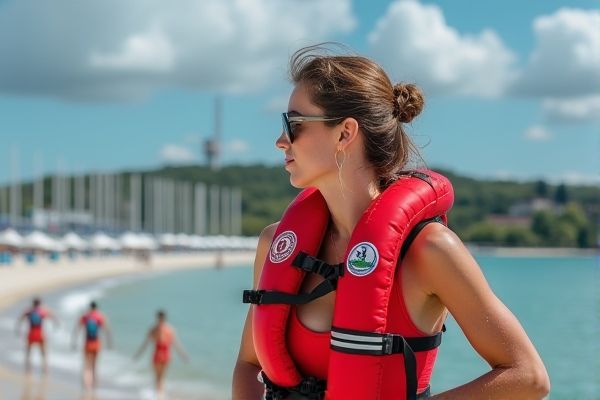
Lifeguard positions in Germany are typically found in public swimming pools, beaches, and water parks. These roles require candidates to be certified in lifeguard training, first aid, and CPR, ensuring they can respond effectively in emergencies. Fluency in German is often essential, although English-speaking positions may be available in tourist areas. Many employers also seek individuals who demonstrate strong communication skills and the ability to work well in a team setting, enhancing safety and enjoyment for all visitors.
Job Description
Lifeguard jobs in Germany involve ensuring the safety of patrons at pools, lakes, and beaches. Responsibilities include monitoring swimming areas, providing first aid, and enforcing safety regulations to prevent accidents. Lifeguards must possess certifications such as the Deutsches Rettungsschwimmabzeichen (German Lifesaving Medal) and may also need additional qualifications in CPR and first aid. These positions often require excellent swimming skills and the ability to remain calm under pressure, making them ideal for those passionate about water safety and public service.
Requirement
Lifeguard jobs in Germany typically require candidates to hold a valid lifeguard certification, such as the Deutsche Lebens-Rettungs-Gesellschaft (DLRG) qualification. Applicants must demonstrate strong swimming skills, alongside proficiency in first aid and CPR techniques. Many employers prefer candidates with experience in aquatic environments, as this helps ensure safety and preparedness. A good command of the German language is often necessary for effective communication in diverse settings, making it an important consideration for your job applications.
Salary and Perks Expected
Lifeguard jobs in Germany typically offer competitive salaries ranging from EUR2,000 to EUR3,000 per month, depending on experience and location. Many positions come with benefits such as health insurance, paid vacation days, and performance bonuses, enhancing the overall compensation package. Working in a secured environment like pools, lakes, or beaches provides opportunities for personal growth and skill development in water safety. Engaging with the community and ensuring the safety of others adds a fulfilling aspect to these roles, making them appealing choices for many individuals.
Similar Job Names
- Rettungsschwimmer
- Wasserwacht Mitglied
- Freibadaufsicht
- Bademeister
- Wasserrettungstrainer
- Schwimmlehrer
- Aquafitness-Trainer
- Sicherheitsbeauftragter im Schwimmbad
- Strandaufseher
- Schwimmhallensicherheitskraft
Job Expectation Concept
Lifeguard jobs in Germany require a strong commitment to safety and public service, with an emphasis on safeguarding swimmers in pools and open water areas. Candidates typically need to hold relevant certifications, such as the German lifeguard qualification (DLRG), which ensures they are trained in first aid and swimming techniques. Your responsibilities may include monitoring swimming areas, enforcing safety rules, and providing emergency assistance when needed. Beyond technical skills, effective communication and a friendly demeanor are essential for fostering a safe and enjoyable environment for all patrons.
Career Advantage and Weakness
Lifeguard jobs in Germany offer a unique career advantage by providing opportunities for outdoor work and community engagement, especially during the summer months. You can gain valuable skills in emergency response, first aid, and customer service, making you a strong candidate for future employment in various fields. However, seasonal work can be a drawback, leading to job instability during off-peak months, which may necessitate pursuing supplemental income. The physical demands of the role can also pose challenges, as maintaining fitness levels is crucial to effectively perform lifeguard duties.
Important Thing Must Know
Lifeguard jobs in Germany often require candidates to possess specific certifications, including a valid swimming lifesaving certificate, such as the Deutsches Rettungsschwimmabzeichen (DRSA). Understanding the local laws and regulations regarding water safety is crucial for ensuring compliance in various aquatic environments. Most positions are found in public swimming pools, lakes, and beaches, especially during the summer months when demand peaks. Your responsibilities typically extend beyond monitoring swimmers to include administering first aid and conducting water rescues when necessary. The job can be both rewarding and challenging, offering opportunities for personal growth and community engagement.
Alternative Career Options
Lifeguards in Germany can explore several alternative career options that leverage their skills and experience. Opportunities in the fields of sports coaching, personal training, or swim instruction allow you to utilize your knowledge of water safety and fitness. Furthermore, roles in recreational management or community outreach programs offer ways to engage with the public while promoting health and wellness. Transitioning into first aid training or emergency response education can also be a fulfilling path, expanding your impact beyond poolside duties.
Companies List
- AquaFit GmbH
- Freizeitbad Aqualand
- Therme Erding
- SchwabenQuellen
- Karls Erlebnis-Dorf
- Badewelt Bebra
- Munsterland Bad
- FCB-Arena Wasserwelt
- Erlebnisbad Wonnemar
- Kolner Sportstatten GmbH
List of Ideal City
Germany offers various cities ideal for lifeguard jobs, showcasing a strong demand for trained professionals. Berlin, with its numerous lakes and swimming pools, provides ample opportunities for seasonal and year-round positions. Munich, known for its vibrant outdoor pool scene, attracts lifeguards due to its large population and commitment to water safety. Surrounding cities like Hamburg and Frankfurt also present viable options, as they maintain public beaches and recreational facilities that require qualified lifeguards to ensure the safety of patrons.
 germanyjobsdata.com
germanyjobsdata.com